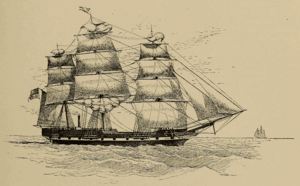USS Massachusetts (1845) facts for kids

This illustration of USS Massachusetts appeared in Cassier's Magazine, December 1894.
|
|
Quick facts for kids History |
|
|---|---|
| Launched | 1845 |
| Acquired | 1 August 1849 |
| Commissioned | 1 August 1849 |
| Decommissioned | May 1859 |
| In service | 17 June 1863 |
| Out of service | February 1867 |
| Fate | sold, 15 May 1867 |
| General characteristics | |
| Tonnage | 765 |
| Length | 178 ft (54 m) |
| Beam | 32 ft 2 in (9.80 m) |
| Draft | 15 ft (4.6 m) |
| Propulsion |
|
| Armament | 4 guns |
The USS Massachusetts (1845) was a steamer built in 1845. The U.S. War Department bought her in 1847. She helped the U.S. Army move troops during the Mexican–American War. Later, in 1849, she joined the U.S. Navy.
Massachusetts traveled a lot, even sailing around Cape Horn many times. This journey took her between the Atlantic and Pacific Oceans. She spent most of her time serving on the west coast of North America.
Contents
Building and Early Adventures
The Massachusetts was a wooden steamer. She was built in 1845 in Boston, Massachusetts. She was one of the first ships to offer regular steamship service. This service connected New York City and Liverpool, England.
In 1847, the War Department bought her. She became a troop transport during the Mexican–American War. In 1848, she sailed around Cape Horn to San Francisco, California. She may have carried members of a special group. This group was called the Joint Commission. They explored the U.S. West Coast. Their job was to find good spots for forts, lighthouses, and buoys.
Serving in the Pacific
The Massachusetts joined the U.S. Navy in San Francisco Bay on August 1, 1849. She became part of the Pacific Squadron. Her main task was to help the Joint Commission.
It was hard to find crew members in California. So, the Massachusetts sailed to Hawaii in late 1849. There, they found crew members from King Kamehameha III. When they returned in March 1850, the Joint Commission gave their first ideas to President Millard Fillmore. They suggested areas around San Francisco Bay for special use.
After this, the Massachusetts and the Joint Commission sailed to Puget Sound. They looked at the mouth of the Columbia River. Then, they returned to California in July 1850. After another trip to San Diego, the Joint Commission finished their work in November 1850. The Massachusetts then began regular Navy duties. She also helped other groups exploring the west coast.
On August 12, 1852, she left San Francisco for the east coast. She stopped in ports in Ecuador, Chile, and Brazil. She arrived in Norfolk, Virginia, on March 17, 1853. The next day, she was taken out of service.
South American Travels
The Massachusetts was put back into service in Norfolk on May 2, 1854. She left for the Pacific Ocean on July 5. She reached the Straits of Magellan on December 13. Finally, she arrived at the Mare Island Navy Yard on May 8, 1855.
In June and July, she sailed along the coast between San Francisco and the Columbia River. Then, she sailed to Central America on August 25. She visited ports from Mexico to Nicaragua. She returned to San Francisco on January 9, 1856.
Adventures in Puget Sound
The Massachusetts left Mare Island on February 17, 1856. She carried guns and supplies to Seattle, Washington. She arrived there on February 24. For over a year, she worked in Puget Sound and the Strait of Juan de Fuca. She visited many ports in Washington Territory. She also visited the British Crown Colony of Vancouver Island.
Conflict at Port Gamble
The Massachusetts was sent to Port Gamble, Washington Territory. Some groups from British and Russian lands had been bothering local Native Americans. When these groups refused to hand over those who had attacked, the USS Massachusetts sent a landing party ashore. A fight happened, and 26 members of the attacking groups and one sailor died.
Later, on August 11, 1857, Colonel Isaac Ebey was killed. He was the first settler on Whidbey Island. This was likely revenge for a chief killed in similar fights the year before. British officials did not chase the northern groups as they went through British waters. Ebey's killers were never caught.
The Massachusetts left the Pacific Northwest on April 4, 1857. She reached Mare Island on April 9. She was taken out of service there on June 17.
Back with the Army
On January 5, 1859, Secretary of the Navy Isaac Toucey ordered the Massachusetts to be prepared. She was to be given back to the War Department. In May 1859, she was given to the Army Quartermaster Corps.
For the next few years, she sailed Puget Sound. Her job was to protect the people living there. This area was changing fast. Many miners and settlers were arriving because of the Fraser Gold Rush and other gold rushes in British Columbia. The Massachusetts was also part of the U.S. military force during the Pig War. This was a tense argument with the Royal Navy over the border in the San Juan Islands. No one was hurt in this dispute.
The Army ordered the Massachusetts to be given back to the Navy on January 27, 1862. She was then put aside at Mare Island and inspected.
Renamed Farallones
The Massachusetts was changed into a storeship. Her engines were taken out, and she became a bark. In January 1863, she was renamed Farallones. She was put back into service on June 17, 1863.
She served ships of the Pacific Squadron as a supply ship. In February 1867, she was taken out of service at Mare Island. She was sold in San Francisco on May 15, 1867.
Images for kids
 | Bayard Rustin |
 | Jeannette Carter |
 | Jeremiah A. Brown |


